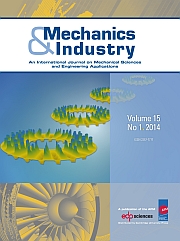No CrossRef data available.
Article contents
Étude numérique du comportement en fatigue à grand nombre de cycles d’agrégats polycristallins de cuivre
Published online by Cambridge University Press: 20 July 2011
Abstract
Une analyse du comportement en fatigue multiaxiale à grand nombre de cycles est conduite à travers la simulation numérique d’agrégats polycristallins. Le matériau métallique choisi est un cuivre de microstructure CFC. Le VER, constitué d’un ensemble de 300 grains d’orientation aléatoire équiprobable et de géométrie équiaxe, est sollicité au niveau de la limite de fatigue définie pour un nombre de cycles de 107 cycles, le but étant de calculer les quantités mécaniques relatives à l’échelle mésoscopique (moyenne à l’échelle du grain) après stabilisation du comportement cyclique local. Les résultats de la simulation montrent la grande dispersion des variables mécaniques à cette échelle mésoscopique. Une analyse statistique de la réponse de l’agrégat est proposée pour différents chargements purement alternés : traction, torsion, traction-torsion combinées en-phase. Grâce à la connaissance des quantités mécaniques locales pour un nombre suffisamment grand de microstructures différentes, une analyse critique de certains critères d’endurance multiaxiaux (Crossland et Dang Van) est conduite.
Keywords
- Type
- Research Article
- Information
- Copyright
- © AFM, EDP Sciences 2011


